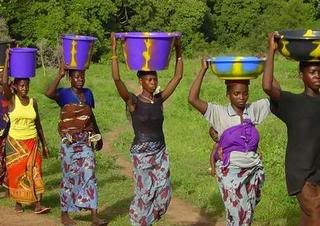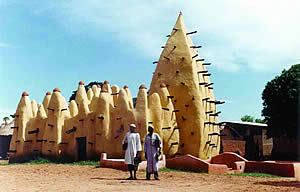
Moolaadé played here in the NY Film Festival in the fall of 2004, thus I missed it because we'd moved to New Orleans by then. It was well worth the effort it took to be informed when it became available on dvd, since the NY Times new dvd column neglected to tell us of its recent release.
As with any film made in Africa, every frame pulsates with data, and the colors and the scenes are harmoniously beautiful, filled with so much vitality they snap off the screen, drive through your eyes, drive like daggers through your eyes, burying themselves in your inner vision.
You may associate Ousmane Sembène with one of the first African films made by an African, back in 1966, Black Girl, a b&w feature film that follows a young girl from Senegal who is brought to France by a white family. Filled with homesickness and sadness, nevertheless her perceptions are sharp, perhaps all the sharper for being an outsider and perhaps not comprehending all that is going on around her. Because we are seeing through her eyes we see in a way that perhaps we had not seen previously, particularly the emptiness and shallowness of the life she's been pulled away from Africa in order to serve.
Born in Senegal, Ousmane Sembène is a sophisticated continental intellectual, a writer as well as a film maker, at 80, made Moolaadé, a film about the struggle of those who wish to end the practice of female genital mutilation, with those who are dead set on retaining the practice, which they call "purification" -- though death happens to young girls and girl-children, not to themselves -- in a village of Burkina Faso. Six girls run from a purification ceremony to the compound of a woman named Collé, begging for her protection. She invokes the "Moolaadé," a spell of protection which cannot be broken without bringing terrible retribution upon those who do so. There is much more going on in the village as well, illustrating so well that during any event, no matter how huge, no matter how many people it touches, the world outside is still going on.
Here's an interview with Ousmane Sembène from 2005 in the UK Guardian.
Here's a review of the film in The NY Times.
A biography, bibliography and filmography of Ousmane Sembène can be found on wiki.


No comments:
Post a Comment